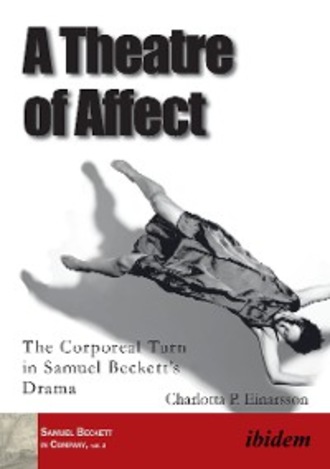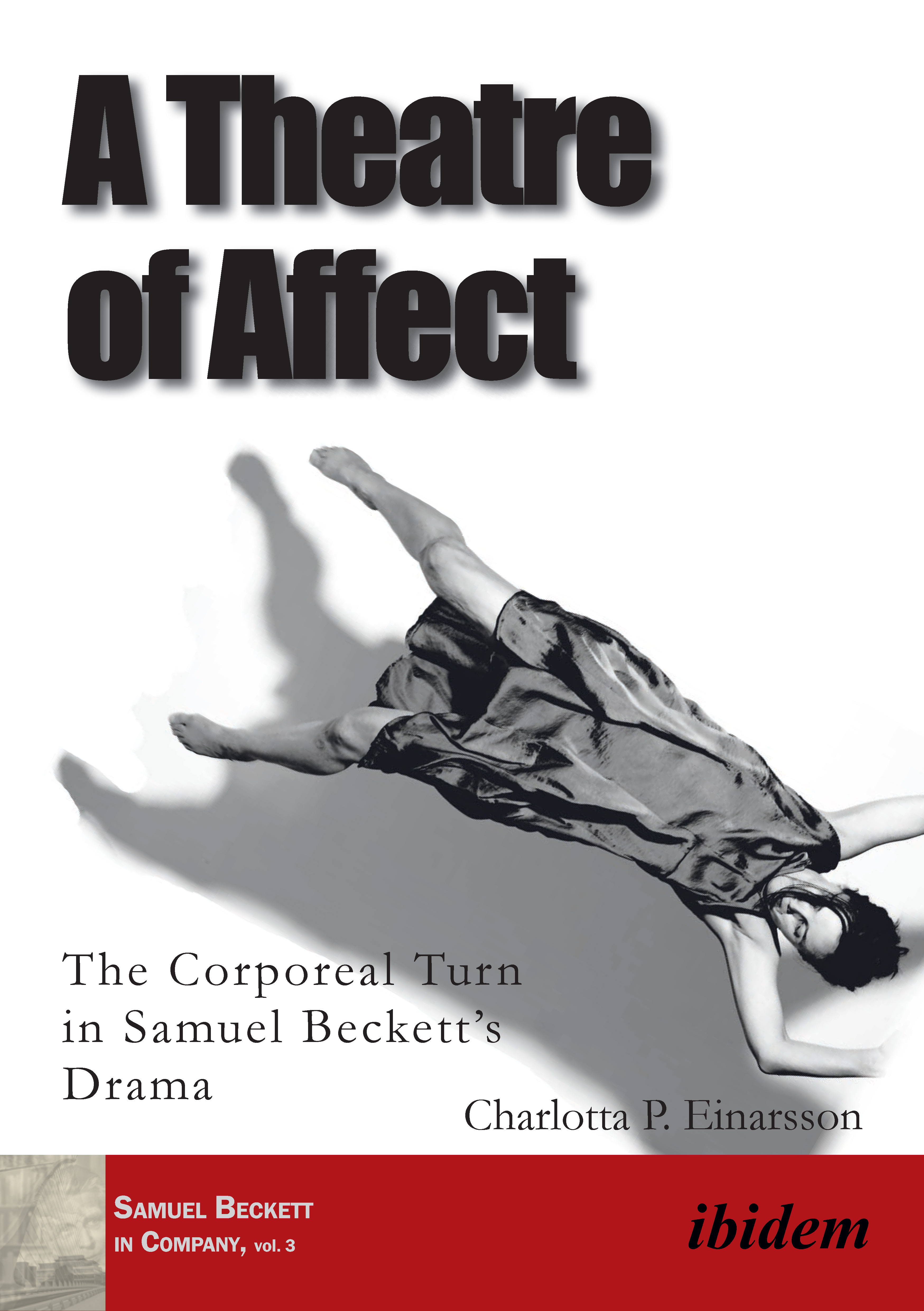
Полная версия
A Theatre of Affect


ibidem Press, Stuttgart
This book is dedicated to Professor Harald W. Fawkner whose teaching of phenomenology opened a new perspective on the world to me.
Every true faith is infallible. It performs what the believing person hopes to find in it. But it does not offer the least support for the establishing of an objective truth. Here the ways of men divide. If you wish to strive for peace of soul and happiness, then believe; if you wish to be a disciple of truth, then inquire.
Friedrich Nietzsche
Table of Contents
List of Abbreviations
Preface
Introduction
About the Title
Why Affect Theory?
The Theatre of Affect
Outline of the book
Limitations
Chapter 1 Phenomenological Presentations
Beckett and Phenomenology
The ‘Rhetorical’ Effect of Affect
The Problem of Expression
The Space Between Subject and Object
Formal Experiments
Understanding is Creative
The Shape of Ideas
Phenomenological Presentations
Chapter 2 The Body as Technology
The Body in Beckett Criticism
The Dys-Appearing Body in Beckett’s Drama
Residual Phenomena
Abstract and Concrete Movements
Directorial Concerns
Seeking to Dehumanise the Actor
The Body in Acting
Performance as Text
Chapter 3 The Corporeal Turn
The Material Phase: Waiting for Godot
Why It Is Not Absurd to Wait for Godot
Suffering
Meaning- and Presence-Effects
‘A poetry of the theatre’
The Organic Phase: Come and Go
Encountering the Universal
Encountering the Particular
A Special Presence
The Atmospheric Phase: Quad
The Performance as Event
Chapter 4 A Theatre of Affect
Resonating Phenomena
‘Difference Staged’
Life Unexamined Is Lost
Getting in Touch with Flesh
Shifting Paradigms
Chapter 5 Meaning
Meaning and Change
The Aesthetics of Gesture
Beckett and Abstraction
The Relation of Part to Whole
Metaphorical Meanings
The ‘Always Already’
Conclusion
Bibliography
Samuel Beckett in Company
Copyright
List of Abbreviations
CDW Samuel Beckett: The Complete Dramatic Works
D Disjecta
TNI The Theatrical Notebooks of Samuel Beckett, Vol. I
TNII The Theatrical Notebooks of Samuel Beckett, Vol. 2
TNIII The Theatrical Notebooks of Samuel Beckett, Vol. 3
TNIV The Theatrical Notebooks of Samuel Beckett, Vol. 4
Preface
This book is evidence of the great support and inspiration I have been given in various contexts and by various people, all of whom have sustained my thinking about the ideas that I present here. For this I am grateful beyond words. Some of you I know well, and some I have only met briefly (or never at all), yet you are all a tangible presence in my world, and I could not have written this book without you.
I also have a special thanks to those who have been more directly involved in the process of writing. Thank you Ishrat Lindblad, my former supervisor, for having taken the time to read and comment on the manuscript in its various stages. The force of your intellect, your scholarly integrity and your perceptive eyes and ears, continue to be an inspiration that propels my thinking and writing—now as always. I am deeply grateful.
Thank you Paul Stewart, for constructive comments and considerate feedback on the manuscript.
Thank you Valerie Lange at ibidem Verlag for helpful and patient guidance throughout the publishing process.
Thank you Giles Whiteley, for insightful and helpful comments on the draft.
Thank you Emre Evrenos for creative input on the design of the front cover.
Thank you Linnea Rudenius for coming to the rescue with technical assistance.
Thank you Håkan Larsson for taking the innovative cover picture.
Thank you Richard Begam, for thoughtful guidance and moral support.
Thank you Matthew Feldman, for generously sharing your insights on various academic issues.
Thank you Beyza Björkman, Elisabet Dellming, Marina Ludwigs my ‘sisters-in-arms’, for always being there, providing much needed loving support.
Thank you Anita Rákóczy, for inspiring me and for reminding me of what really matters in life.
Thank you my one and only Magnus Einarsson, for everything.
Finally, I would like to thank the Terserus and Ahlström Stipend Foundation, Stockholm University, for providing the financial support that made writing this book possible.
Introduction
Those … who believe that they either speak or are silent, or do anything from a free decision of the mind, dream with open eyes.
Spinoza, Ethics
Have you ever tried to hide your sobs in the theatre? Become so excited or embarrassed that you could not keep still, or been suspended between tears and laughter when reading? Then you would have sensed the deep interconnections between body and mind that “marks a body’s belonging to a world of encounters” (Seigworth and Gregg 2010, 2). Affect means, “to have a material effect on; to make a material impression on; to influence, move, touch” (OED v3), Pre-verbal and unformed, affect resides in sensations yet to be cognised, seizing our whole sensorium. Affected, we are moved to respond even before we have time to think and as human beings we are therefore always responding to more than we are consciously aware of. That is to say, our engagements with the world are not merely dependent on our minds’ processing and evaluating the various situations we encounter, but on our bodies’ immersion in time and space.
A key element in Samuel Beckett’s theatre, affect is equal to, yet profoundly different from, language. The plays set up and organise encounters between audiences and various non-linguistic elements emerging, for instance through the tensions, directions, and rhythms of the characters’ bodies on stage. The sounds of characters rhythmically moving or the visual spacing of their bodies are therefore as important as anything the characters say. Beckett’s dramas are phenomenological presentations experimenting with the form of expression. The aim of these formal experiments is to intervene in the processes of signification and meaning-making before the mediating operations of language have emerged to take control. As a result, Beckett’s theatre of affect prompts audiences to forge attachments with the stage presentations beyond the level of language. In the pages that follow, I will move on to suggest not only that the integration of sense and sense-making in Beckett’s dramas is an important aspect of towards , but also that the reconfiguration of the aesthetic object taking place through this integration of body and mind has profound implications for the production of meaning in the context of performance.
Lesen Sie weiter in der vollständigen Ausgabe!
Lesen Sie weiter in der vollständigen Ausgabe!
Lesen Sie weiter in der vollständigen Ausgabe!
Lesen Sie weiter in der vollständigen Ausgabe!
Lesen Sie weiter in der vollständigen Ausgabe!
Lesen Sie weiter in der vollständigen Ausgabe!
Lesen Sie weiter in der vollständigen Ausgabe!
Lesen Sie weiter in der vollständigen Ausgabe!
Lesen Sie weiter in der vollständigen Ausgabe!
Lesen Sie weiter in der vollständigen Ausgabe!

